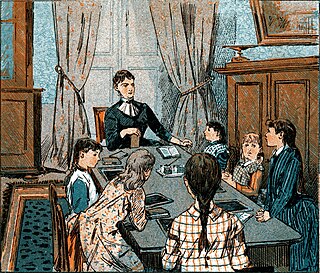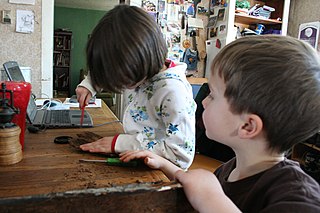Related Research Articles

Homeschooling or home schooling, also known as home education or elective home education (EHE), is the education of school-aged children at home or a variety of places other than a school. Usually conducted by a parent, tutor, or online teacher, many homeschool families use less formal, more personalized and individualized methods of learning that are not always found in schools. The actual practice of homeschooling varies considerably. The spectrum ranges from highly structured forms based on traditional school lessons to more open, free forms such as unschooling, which is a lesson- and curriculum-free implementation of homeschooling. Some families who initially attended a school go through a deschool phase to break away from school habits and prepare for homeschooling. While "homeschooling" is the term commonly used in North America, "home education" is primarily used in Europe and many Commonwealth countries. Homeschooling should not be confused with distance education, which generally refers to the arrangement where the student is educated by and conforms to the requirements of an online school, rather than being educated independently and unrestrictedly by their parents or by themselves.

Unschooling is an informal learning method that prioritizes learner-chosen activities as a primary means for learning. Unschoolers learn through their natural life experiences including play, household responsibilities, personal interests and curiosity, internships and work experience, travel, books, elective classes, family, mentors, and social interaction. Often considered a lesson- and curriculum-free implementation of homeschooling, unschooling encourages exploration of activities initiated by the children themselves, under the belief that the more personal learning is, the more meaningful, well-understood, and therefore useful it is to the child.
Deschooling is a term invented by Austrian philosopher Ivan Illich. Today, the word is mainly used by homeschoolers, especially unschoolers, to refer to the transition process that children and parents go through when they leave the school system in order to start homeschooling. The process is a crucial basis for homeschooling to work. It involves children gradually transitioning away from their schoolday routine and institutional mentality, redeveloping the ability to learn via self-determination, and discovering what they want to learn in their first homeschool days.

The Home School Legal Defense Association (HSLDA) is a United States-based organization that seeks to advance the freedom of parents to homeschool their children. HSLDA describes itself as a "Christian organization."

Rosetta Stone Language Learning is proprietary, computer-assisted language learning (CALL) software published by Rosetta Stone Inc, part of the IXL Learning family of products. The software uses images, text, and sound to teach words and grammar by spaced repetition, without translation. Rosetta Stone calls its approach Dynamic Immersion.

Homeschooling constitutes the education of about 3.4% of U.S. students as of 2012. The number of homeschoolers in the United States has increased significantly over the past few decades since the end of the 20th century. In the United States, the Supreme Court has ruled that parents have a fundamental right to direct the education of their children. The right to homeschool is not frequently questioned in court, but the amount of state regulation and help that can or should be expected continues to be subject to legal debate.
Wendy Priesnitz is a Canadian advocate of alternative education and environmentalism. She was leader of the Green Party of Canada from July 1996 to January 1997.

Charlotte Maria Shaw Mason was a British educator and reformer in England at the turn of the twentieth century. She proposed to base the education of children upon a wide and liberal curriculum. She worked for five years under Fanny Trevor at Bishop Otter College.
Laurel Springs School is a WASC-accredited K–12 distance learning private school in Ojai, California, United States. Laurel Springs School offers personalized resources, customizable curricula, individualized teacher services, college advising and other services to families attending public and private school.
Connections Academy is a for-profit corporate provider of online school products and services to virtual schools for grades K-12, including full-time online school. In the United States the company is noted as Connections Academy, and for students abroad it is known as International Connections Academy. Based in Columbia, Maryland, Connections Academy is part of Pearson's Online and Blended Learning K-12 group. Online schools are an alternative to traditional public schools. Similar to charter schools, they are subsidized by the state. Although they contract with many non-profit schools, they are a for-profit corporation.
Catherine Levison is the author of four books. She is also a public speaker to parenting, homeschooling and educational audiences throughout the United States and Canada. She is also a columnist for The Link magazine. Levison lives with her family in the Puget Sound region of Washington state.
The legality of homeschooling in India and a plethora of alternative education schools spread over different states has been debated by educators, lawmakers, and parents since the passing of the Right of Children to Free and Compulsory Education Act (RTE) which makes formal education a fundamental right of every child between the ages of 6 and 14 and specifies minimum norms for schools. While the legality of homeschooling still remains a grey area, there have been petitions by parents and alternate schools in the past for granting relief. As per the Universal Declaration of Human Rights to which India is a signatory, quote: "Parents have a prior right to choose the kind of education that shall be given to their children."

Homeschooling is illegal in many countries. Countries with the most prevalent homeschooling movements include Australia, Canada, New Zealand, the United Kingdom, and the United States. Some countries have highly regulated homeschooling programs as an extension of the compulsory school system; others, such as Germany, have outlawed it entirely. In some other countries, while not restricted by law, homeschooling is not socially acceptable, or is considered undesirable, and is virtually non-existent.
Homeschooling in New Zealand is legal. The Ministry of Education reports annually on the population, age, ethnicity, and turnover of students being educated at home.

Ramaa Devi Mosley is an American filmmaker, director, and writer based in Los Angeles. She began directing commercials, music videos, and documentaries at the age of 16. She is also an activist, known for raising national and international awareness about the importance of education of girls globally. She has supported the victims of the Chibok schoolgirl kidnapping in Nigeria by using social media to raise global awareness.

The University of Mississippi High School is an accredited, comprehensive, online high school operated by the Office of Pre-College Programs in the Division of Outreach and Continuing Education at the University of Mississippi. It offers online classes for students in grades 7 through 12, allowing students to earn high school Carnegie units, dual credit through the university, and a high school diploma from anywhere in the United States or the world.
In Canada, homeschooling has increased in popularity since the advent of the 21st century. It is legal in every province, with each province having its own regulations around the practice. In some provinces, funding is available. In 2016, the number of homeschooled children in Canada was approximately 60,000 ; this corresponds to approximately one in every 127 school-aged children. In 2020, the average growth rate of the practice amounted to more than 5 per cent per year. Canada has a large proportion of non-religiously motivated homeschoolers compared to some other countries. It is also one of three countries worldwide, along with the United States and South Africa, that hosts an organization with lawyers on staff which serves the legal needs of home educators.
In Australia, homeschooling is becoming increasingly popular. It is legal in all Australian states and territories, with each having its own regulations around the practice. Distance education is also prevalent for Australians who live in remote, rural areas. There are more than a dozen universities in Australia that support distance education for tertiary studies. Some Australians switch between distance education and classroom teaching. The number of homeschooled children and students who take distance education in Australia is approximately 30,000. The number of registered homeschoolers alone was 21,437 in 2019; this corresponds to 0.5 per cent of the total school population of Australia. In the 2010s, the average growth rate of the practice amounted to 9.4 per cent per year. The largest Christian school of distance education in Australia is the Australian Christian College, which has over 1,700 families with 4,000 students enrolled. Homeschooling generally enjoys a very good reputation in the Australian media and is widely seen as a flexible alternative form of education with good socialisation opportunities in the community.
Time4Learning is an American homeschooling curriculum provider. It is based in Dallas, Texas. Cheryl Dodge is the incumbent president of the organization.
References
- ↑ SAILLANT, CATHERINE (1995-11-28). "ABCs by E-Mail : Home-schooling uses the Internet to beam instruction, view of world to students' computers. : NEXT L.A. / A look at issues, people and ideas helping to shape the emerging metropolis". Los Angeles Times. ISSN 0458-3035 . Retrieved 2017-04-11.
- ↑ "Creating a Learning Style Friendly Approach - Marily Mosley - Homeschool.com's Extravaganza of ExpertsHomeschool.com - The #1 Homeschooling Community". www.homeschool.com. Retrieved 2017-04-11.
- ↑ "An Annual Review of Policy and Practice" Keeping Pace with K-12 Digital Learning. Retrieved 2017-04-11.
- ↑ "Laurel Springs - Today Show". Vimeo. Retrieved 2017-04-11.
- ↑ "Homeschooling Articles - Homeschool.com - The #1 Homeschooling Community". www.homeschool.com. Retrieved 2017-04-11.
- ↑ Moore, Michael Grahame (2013-05-07). Handbook of Distance Education. Routledge. p. 574. ISBN 9781136635564.
- ↑ "Ojai 'School to the Stars' uses Web to teach athletes, actors" . Retrieved 2017-04-11.
- ↑ "How Homeschooling Grew (mid 1980s to the mid 1990s) | Homeschooling Catholic". www.homeschoolingcatholic.com. Retrieved 2017-04-11.
- ↑ "Laurel Springs School Brings American College Prep to South Korea -- THE Journal". THE Journal. Retrieved 2017-04-11.
- ↑ "USDLA Awards Marilyn Mosley Gordanier and Laurel Springs School". Best Online High Schools. 2010-10-06. Retrieved 2017-04-11.
- ↑ "USDLA Award Winners" Distance Learning, Volume 5, #2. Retrieved 2017-04-30.
- ↑ "Food4School: Getting Girls in the Classroom by Feeding Their Families". Women & Girls. Retrieved 2017-04-11.
- ↑ "Message from the Director". www.global500.org. Retrieved 2017-04-11.
- ↑ "G500 - September 2004" (PDF). UN Environment.
- ↑ "BOARD Profiles | Captain Planet Foundation". captainplanetfoundation.org. Retrieved 2017-04-11.
- ↑ "The United States Club of Rome - Biographies — Preview — Preview". usacor.org. Retrieved 2017-04-11.
- ↑ Gordanier, Marilyn Mosley (2016-03-30). "The Importance of Ethical Education". Huffington Post. Retrieved 2017-04-11.
- ↑ "Marilyn Mosley Gordanier | The Huffington Post". www.huffingtonpost.com. Retrieved 2017-04-11.